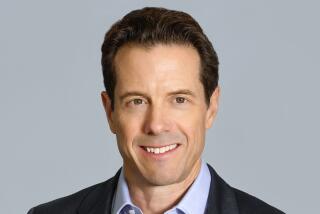Building community, commerce for Viacom
- Share via
YouTube proved that Comedy Central’s faux news anchors, Jon Stewart and Stephen Colbert, could attract a substantial Web following along with their late-night television audiences.
It’s Erik Flannigan’s job to build on that momentum. Viacom Inc.’s MTV Networks Entertainment Group, which oversees Comedy Central, plans to announce today that it has promoted him to executive vice president of digital media. He is tasked with plotting digital strategy for the popular channel as well as Spike TV and TV Land, Internet sites AtomFilms and GameTrailers, and Xfire, a messaging program for PC gamers.
At 41, Flannigan is already a grizzled veteran of Internet video. Before joining MTV as a senior vice president of digital media last fall, he oversaw Time Warner Inc.’s Moviefone, AOL Music and AOL Radio. Before that he headed programming for MovieBeam, Walt Disney Co.’s video-on-demand project, and was vice president of music services and programming at RealNetworks Inc.
He spoke with The Times this week.
What did MTV learn from its experience with YouTube?
One thing YouTube taught us all about is timeliness and the desire of the community to actually comment on what they were watching. It was a great way to watch that clip that everyone was talking about. But there was by no means a predictable way to watch last night’s “Daily Show.”
Today, we deliver on that promise, if you missed last night’s show and you want to see it. The next thing, beyond last night and last week, is the entire history of the show. How do you bring that back to life?
What’s your digital strategy for MTV?
Of course we’re extending onto all the digital platforms. But the strategy goes beyond repurposing assets. The audience now, in 2007, is eager to contribute to the dialogue. It’s not only about consuming the video and reacting to the video.
[The challenge is] how do you own your own programming when you are part of the social fabric of this country, part of the zeitgeist?
With “The Daily Show” and “The Colbert Report,” we want to make sure if people are reacting to what’s going on on the show, they’re doing it in our world and on our [Web] pages.
What’s the biggest business challenge?
TV and radio, these things were built on the model of advertising. That’s the biggest challenge ahead of us. No matter what TV network you are, no matter what old-media business you are, you’re still looking at revenue -- how does my digital revenue grow?
Why has MTV decided to merge one of the original online video sites, IFilm, into spiketv.com?
IFilm had incredible success as really the viral video site of choice before YouTube was born. But YouTube has reached a level of ubiquity. When you can type in “Bulgarian rugby results” and get something meaningful back, you’re just at a very different level than anyone else can be.
[Spike TV will focus instead on] the appetite, the things that guys care about, in categories like anime [and] the emergence of mixed martial arts.
A lot of people think comedy is ideally suited for the snack-sized video that’s popular online. How does MTV capitalize on that?
It’s amazing how many folks are playing in the short-form comedy space now. It feels like a new brand going after that audience is born every day. Comedy Central is the heir apparent, but we need to recognize that the sensibilities of the Web and television are different.
There’s an opportunity to move toward a younger demographic and a Web sensibility that is often edgier, and to move away from television standards. To establish Comedy Central not as a new brand but to create a second identity on the Web.
--
More to Read
The biggest entertainment stories
Get our big stories about Hollywood, film, television, music, arts, culture and more right in your inbox as soon as they publish.
You may occasionally receive promotional content from the Los Angeles Times.










